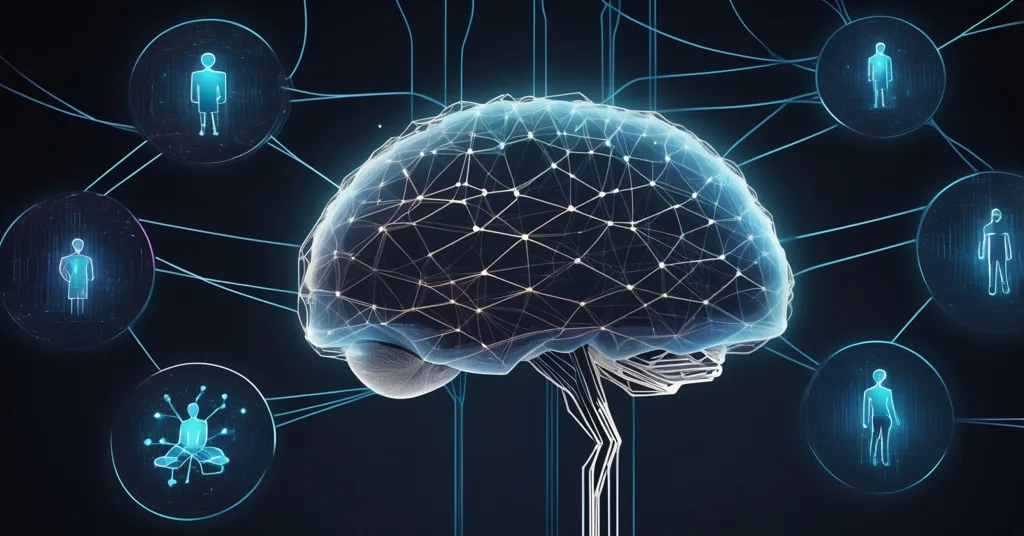AI and Blockchain Unite: A Transparent Fix for Ethical Tech Challenges

AI and Blockchain: Forging a Transparent Future for Ethical Tech
The fusion of artificial intelligence (AI) and blockchain technology might just be the knockout punch we need to tackle systemic bias in tech while supercharging innovation. With AI’s flaws glaringly exposed through biased data, and regulatory bodies snoozing on the job, blockchain steps in as a decentralized savior, promising transparency, fairness, and economic empowerment—especially in emerging markets.
- AI bias affects up to 38% of datasets, skewing tech like facial recognition.
- Blockchain offers decentralized data labeling for transparency and fair pay via stablecoins.
- Diverse data is both an ethical must and a competitive edge in the AI race.
AI’s Bias Problem: The Ugly Truth
Artificial intelligence holds the promise of transforming industries with mind-blowing speed and efficiency, but it’s dragging along a nasty baggage of human prejudice. Up to 38% of the data feeding AI systems is tainted with biases, often reinforcing racial and gender stereotypes. Think of AI as a student learning from a biased textbook—if the source material is skewed, the lessons it teaches are pure garbage. Nowhere is this more evident than in facial recognition tech. A 2019 benchmark by the National Institute of Standards and Technology (NIST) revealed that these algorithms misidentify Black or Asian faces at rates 10 to 100 times higher than white faces, as detailed in studies on algorithmic bias in facial recognition. A more recent 2024 study added fuel to the fire, showing facial expression models misread anger as disgust 2.1 times more often in Black females compared to White females. These aren’t minor bugs; they’re systemic failures that could have real-world consequences, from wrongful arrests to denied opportunities.
Why does this keep happening? AI is only as good as the data it’s trained on. If that data reflects historical inequities or is lazily curated by overworked teams, the output will inevitably perpetuate the same old crap. It’s not just an ethical disaster—it’s a practical one. Bad data equals bad AI, and in a cutthroat field where tiny accuracy gains can mean millions in profit, that’s a fatal flaw. Johanna Cabildo, CEO of Data Guardians Network (D-GN) and a heavyweight in web3 and AI projects for clients like the Saudi Government, Saudi Aramco, and Cisco, puts it bluntly:
“In the AI arms race, better data means better performance, and decentralization turns diversity from a moral obligation into a competitive edge.”
She’s dead on. As she also notes, “Those with the best data will have the best AI.” With the global data annotation market—crucial for creating high-quality training data—projected to balloon to $8.22 billion by 2028, the race to clean up AI’s act is more urgent than ever, especially when considering the impact of diverse data on AI competitiveness.
Blockchain’s Fix: Transparency on Steroids
Enter blockchain, the tech that birthed Bitcoin and flipped the script on trust. Its decentralized, immutable ledger is like a truth machine, making it the perfect antidote to AI’s opaque data mess. Picture this: instead of data labeling—the tedious but critical process of tagging and categorizing datasets for AI—being controlled by shadowy corporations, it’s handled by a transparent network. Every contribution is logged on the blockchain, every source is traceable, and no one can fudge the records. Decentralized data annotation isn’t just a pipe dream; it’s a practical solution for ensuring data integrity, as explored in discussions on blockchain solutions for AI data transparency.
Here’s how it works in simple terms. Contributors—real people tagging images, text, or audio—upload their work to a blockchain-based platform. The blockchain records who did what and when, immutably. Smart contracts (self-executing agreements coded on networks like Ethereum) automatically trigger payments once the work is verified, no middleman needed—think of them as digital vending machines where you input data and get paid instantly. This transparency ensures ethically sourced data while cutting out the corporate gatekeepers who often exploit workers or cherry-pick biased datasets. Bitcoin’s trustless design set the stage for this rebellion against centralized power, showing us how to ditch middlemen in finance. Now, it’s time to apply that same grit to AI’s data monopolies, with insights from experts like Johanna Cabildo of Data Guardians Network leading the charge.
But blockchain isn’t just about ethics—it’s about cold, hard competitiveness. Cabildo nails it when she says, “Diversity is no longer a checkbox; it’s a competitive advantage.” Diverse datasets, especially “frontier data” (information from underrepresented or emerging regions that adds unique perspectives to AI models), can drastically improve AI performance. Small accuracy boosts translate to massive economic returns, much like shaving milliseconds in financial trading. Blockchain makes sourcing this varied data not just feasible, but profitable.
Stablecoins and Emerging Markets: A Win-Win?
One of blockchain’s killer apps here is fair compensation through stablecoins—cryptocurrencies pegged to stable assets like the US dollar to avoid the wild volatility of something like Bitcoin. These digital tokens enable borderless, consistent payments without the predatory fees of traditional banking or the headaches of currency fluctuations. For data labelers in emerging economies like parts of Africa or Southeast Asia, this is a game-changer. Data labeling can become a viable income stream, often outpacing local wages, while feeding AI systems with the diverse input they desperately need to shed their biases, as discussed in analyses of stablecoins supporting data labeling in emerging markets.
This isn’t charity; it’s smart economics. Empowering underrepresented communities to contribute to the $8.22 billion data annotation market positions these regions as key players in the AI boom. Stablecoins make it happen by ensuring location-agnostic pay—whether you’re in Lagos or London, your work is valued the same. Chris Harmse of BVNK captures the momentum, stating, “We are entering a period of escape velocity in terms of everyone recognizing [stablecoins] as a new and upgraded payments technology.” If done right, this could be a rare win-win in tech, aligning profit with social good, with projections on their impact seen in reports about stablecoin payments in emerging economies for 2025.
But let’s cut the bullshit—scammers are circling like vultures in this space. Fake data labeling platforms promising instant riches via stablecoins are popping up faster than you can say “phishing scam.” Vet these platforms like your wallet depends on it—because it does. Look for verifiable blockchain records, check community reviews, and never trust too-good-to-be-true payment promises. We’re here to drive adoption, not feed con artists.
The Roadblocks: Privacy and Regulation
For all its promise, blockchain-AI integration isn’t a smooth crypto highway—expect potholes. First, there’s the privacy paradox. Blockchain’s transparency is its strength, but without ironclad safeguards, it risks exposing contributor data. Imagine a data labeler in a sensitive region having their identity leaked because some platform skimped on security. Solutions like zero-knowledge proofs (a cryptographic trick that proves data is legit without revealing the data itself) can help, but they’re not foolproof and often come with computational overhead. Projects in the crypto space are working on this, but it’s a glaring weak spot that needs addressing before we go all-in on decentralized data systems, with ongoing research into blockchain and AI integration for ethical technology.
Then there’s regulation—or the lack of it. Governments are hitting the snooze button on ethical AI standards, often prioritizing profit over principle. Cabildo points out, “Even as legislation lags or deprioritizes ethics in AI, the industry has a chance to set its own standards.” She’s not wrong. While the EU’s AI Act aims for a 2026 rollout with some teeth, globally, it’s a patchwork mess. Don’t expect lawmakers to ride in as saviors anytime soon. Self-regulation is the name of the game, for better or worse, as highlighted in opinions on AI meeting blockchain and the need for transparency.
Stablecoins also face their own hurdles. Eric Barbier of Triple-A warns, “It feels like stablecoins are being hyped as the solution to everything… It’s a bit much.” He’s got a point—scalability is a real issue. If millions of data labelers are processing microtransactions, can current blockchain networks handle the load without choking on transaction speeds or fees? It’s a messy middle ground. Stablecoins are a powerful tool for equitable pay, but they’re not a magic bullet, and regulatory crackdowns could throw a wrench in adoption.
Job Displacement and Decentralization’s Counterpunch
Let’s not ignore the big, scary shadow in the room: job displacement. Speculation from firms like McKinsey suggests AI could axe up to 800 million jobs through automation. It’s a gut punch of a number, fueling anxiety about tech’s impact. But here’s where data labeling flips the script. Far from being just a Band-Aid, it creates new gigs in a market starving for human input. Blockchain ensures those gigs are accessible globally, not hoarded by Big Tech in Silicon Valley. This isn’t just mitigating AI’s dark side; it’s harnessing its momentum to disrupt centralized data monopolies.
Bitcoin’s ethos of decentralization—born from a middle finger to centralized power—resonates here. Its immutable ledger is the gold standard of trustless systems, but altcoins have their niche too. Ethereum’s smart contracts automate payouts for data labelers, while protocols like Polkadot explore interoperable data systems. Bitcoin doesn’t need to do it all, and that’s fine—let these tools fill gaps as part of the broader financial revolution. This aligns with effective accelerationism (e/acc), the idea of pushing tech forward fast to solve systemic rot, not just patch it up, with further insights available in updates on AI bias and facial recognition error rates from NIST benchmarks.
What’s Next for AI and Blockchain?
The collision of AI and blockchain isn’t just a nerdy experiment; it’s a battleground for tech’s soul. Will we accelerate toward a decentralized, fairer digital economy, or stumble into another era of centralized control dressed in shiny new code? The tools are here—transparency through blockchain, fairness via stablecoins, and the disruptive spirit of Bitcoin. But it’s on us, from developers to users to decentralization diehards, to demand ethical standards and reject half-assed measures. If you’re as fed up with Big Tech’s data games as we are, back platforms that put power in your hands. Let’s not screw this up with complacency or let scammers run the show.
Key Questions and Takeaways
- How does AI bias mess with real-world technology?
It distorts critical tools like facial recognition, misidentifying Black or Asian faces at rates up to 100 times higher than white faces, and misreading emotions like anger as disgust more often in Black females, all due to flawed, unrepresentative training data. - Can blockchain really tackle AI’s ethical data issues?
It’s a strong contender, enabling decentralized data labeling with transparent, traceable contributions on immutable ledgers, ensuring diverse, ethical data and fair pay via stablecoins—though privacy risks and scams are hurdles to watch. - Why are stablecoins a big deal for AI data workers in emerging markets?
Pegged to stable assets like the US dollar, they offer consistent, borderless payments without banking fees or currency volatility, creating solid income streams for data labelers in regions like Africa, fueling the $8.22 billion data annotation market. - What are the biggest barriers to blockchain-AI integration?
Privacy concerns loom large—contributor data could be exposed without robust safeguards like zero-knowledge proofs—while regulatory lag, prioritizing profit over ethics, and stablecoin scalability issues could slow widespread adoption. - How does diverse data fuel AI competitiveness?
Varied datasets boost AI accuracy, turning tiny improvements into massive economic gains, akin to split-second wins in financial markets, making diversity a strategic necessity, not just an ethical bonus. - What’s Bitcoin’s role in this tech upheaval?
Bitcoin’s trustless, decentralized design is the blueprint for disrupting centralized data monopolies in AI, inspiring transparency and empowerment, while altcoins like Ethereum add complementary firepower with smart contracts for automated pay.



